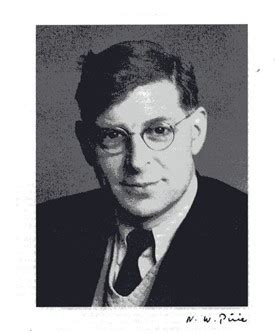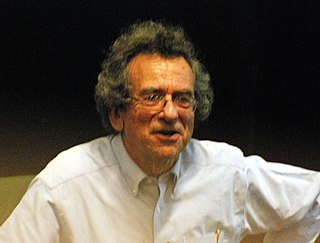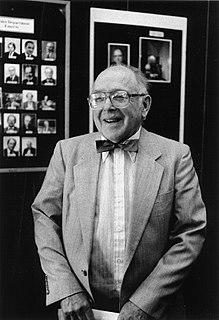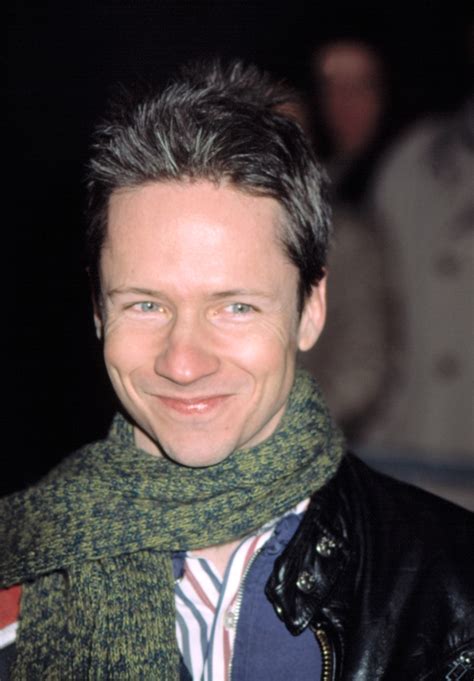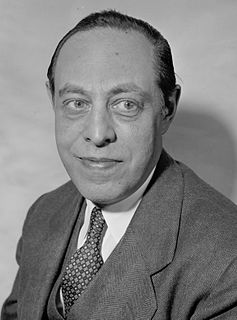A Quote by Norman Pirie
My teacher, Hopkins, often commented on the craving for certainty that led so many physicists into mysticism or into the Church and similar organisations ... Faith seems to be an occupational hazard for physicists.
Related Quotes
It is quite true that many scientists, many physicists, maintain that the physical constants, the half dozen or so numbers that physicists have to simply assume in order to derive the rest of their understanding ... have to be assumed. You can't provide a rationale for why those numbers are there. Physicists have calculated that if any of these numbers was a little bit different, the universe as we know it wouldn't exist.
Physicists only talk to physicists, economists to economists-worse still, nuclear physicists only talk to nuclear physicists and econometricians to econometricians. One wonders sometimes if science will not grind to a stop in an assemblage of walled-in hermits, each mumbling to himself words in a private language that only he can understand.
...contemporary physicists come in two varieties. Type 1 physicists are bothered by EPR and Bell's Theorem. Type 2 (the majority) are not, but one has to distinguish two subvarieties. Type 2a physicists explain why they are not bothered. Their explanations tend either to miss the point entirely (like Born's to Einstein) or to contain physical assertions that can be shown to be false. Type 2b are not bothered and refuse to explain why.
Over the last century, physicists have used light quanta electrons, alpha particles, X-rays, gamma-rays, protons, neutrons and exotic sub-nuclear particles for this purpose. Much important information about the target atoms or nuclei or their assemblage has been obtained in this way. In witness of this importance one can point to the unusual concentration of scattering enthusiasts among earlier Nobel Laureate physicists. One could say that physicists just love to perform or interpret scattering experiments.
If you look at the last 150 years, about every 30 years or so, a new scientific discipline emerges that starts spinning out technologies and capturing people's imaginations. Go back to 1900: That industry was chemistry. People had chemistry sets. In the 1930s, it was the rise of physics and physicists. They build on each other. Chemists laid the experimental understanding for the physicists to build their theories. It was three physicists who invented the transistor in 1947. That started the information revolution. Today, kids get computers.
I recognize that many physicists are smarter than I am-most of them theoretical physicists. A lot of smart people have gone into theoretical physics, therefore the field is extremely competitive. I console myself with the thought that although they may be smarter and may be deeper thinkers than I am, I have broader interests than they have.
Some physicists solve that problem of the necessity of finely tuned physical constants ... by invoking the anthropic principle, saying, well, here we are, we exist, we have to be in the kind of universe capable of giving rise to us. That in itself is, I think, unsatisfying, and as John Lennox rightly says, some physicists solve that by the multiverse idea-the idea that our universe is just one of many universes.
Chemists are, on the whole, like physicists, only 'less so'.They don't make quite the same wonderful mistakes, and much what they do is an art, related to cooking, instead of a true science. They have their moments, and their sources of legitimate pride. They don't split atoms, as the physicists do. They join them together, and a very praiseworthy activity that is.
We want no dictatorship of physicists, as physicists. If our democracy is to realize its full promise, we want no dictatorship at all - of any species. What we want and need is the enlightened and active interest of all men of intelligence and goodwill in their government, and their participation in its functions.
Whenever I want to represent or depict the official version, I will refer to them as 'mathematicians' or 'mathematical physicists' or idiots or something like that. There are no physicists in mainstream 'Physics.' From Newton to Einstein to Hawking, they are all just mathematicians as far as Science and Physics are concerned.
It seems hopelessly improbable that any particular rules accidentally led to the miracle of intelligent life. Nevertheless, this is exactly what most physicists have believed: intelligent life is a purely serendipitous consequence of physical principles that have nothing to do with our own existence.
